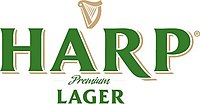Harp Lager
 | |
| Inception | 1960 |
|---|---|
| Manufacturer | Diageo |
| Website | Diageo.com: Harp lager |
| Notes Pale lager | |
Harp Lager is an Irish lager created in 1960 by Guinness in its Great Northern Brewery, Dundalk. It is a major lager brand throughout most of Northern Ireland, but is now rarely available in the Republic of Ireland.
History

Harp Lager was first produced in 1960 as a bottled beer by the Guinness company (now Diageo), in response to the trend among drinkers in Britain and Ireland towards Continental lager. Guinness converted its Dundalk brewery into a modern lager production plant with the guidance of Dr. Herman Muender, a distinguished German brewer.[1] Various names were considered for the brand, including Atlas, Cresta and Dolphin, before Harp was chosen.[2] The brand was marketed with the Brian Boru harp as its emblem.
By 1961 a consortium of brewers, Courage, Barclay & Simonds, Scottish & Newcastle, Bass, Mitchells & Butlers and Guinness, grouped together as Harp Lager Ltd to brew and market the beer.[3][4] Courage's Alton Brewery, where Courage Director's had been brewed, was rebuilt to produce the lager in Great Britain.[2]
By 1964, the product was being sold on draught and led in its category for sales. Members of the Harp consortium changed over the years, with Courage and Scottish & Newcastle leaving in 1979, but becoming franchisees.[5] Currently available on draught, and in 330ml and 500ml bottles, its top market is Ulster, especially Northern Ireland and County Donegal. In 2005, Harp saw a makeover as Diageo Ireland separated the brand from Guinness.
On 9 May 2008, Diageo Ireland announced that it would close the Dundalk Brewery along with the Kilkenny Brewery over a five-year period.[6] The last Harp was brewed at Great Northern in October 2013, after which production moved to Diageo's sole Irish brewery, St James's Gate Brewery in St. James's Gate, Dublin.[7]
Today, Harp is brewed in the Dublin brewery for Ireland and Hydes Brewery for Great Britain.[dubious – discuss] In Australia, distribution is handled by Carlton & United Breweries.
Harp sold in America is brewed in Canada by Guinness Canada and is typically brewed at the Moosehead Brewery in New Brunswick.[8]
Marketing

For many years the slogan "Harp stays sharp" was used in advertisements. It was written by the advertising executive Rod Allen.[9] Recently it has used the slogan "Look on the Harp side".
References
- ^ "Harp medal-winning lager – Diageo Ireland". replay.waybackmachine.org. Archived from the original on 8 February 2009. Retrieved 12 March 2011.
{{cite web}}: CS1 maint: unfit URL (link) - ^ a b "The Grand Union Brewery - History of Lager". www.siteset.co.uk. Retrieved 12 March 2011.
- ^ Lawrence A. Wenner, Steven J. Jack (2009). Sport, beer, and gender: promotional culture and contemporary social life. Peter Lang. p. 60. Retrieved 12 March 2011.
- ^ Alcohol and temperance in modern ... - Google Books. books.google.co.uk. Retrieved 12 March 2011.
- ^ "Dundalk grows and develops"archive link September 2006 (Wayback Machine), Diageo
- ^ RTE news: closure of two Diageo breweries
- ^ Irish Independent: Harp brewery shuts up shop after half-century
- ^ This one is Irish Canadian
- ^ "Rod Allen – Obituary". The Times. Retrieved 12 March 2011.
External links
